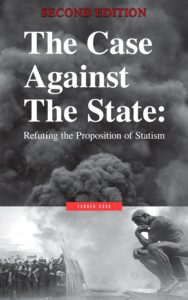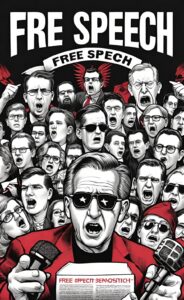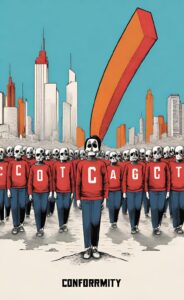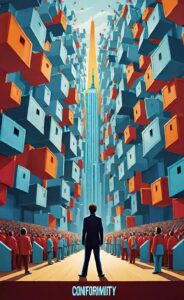The power of the pen is often underrated. Words, when skillfully wielded, can inspire change, evoke emotions, and spark dialogues. This power is magnified when the written word is imbued with personal beliefs and convictions, and the writer bravely exercises their freedom of speech.
The Art of Finding Your Voice in Writing
Unearthing your unique writing voice is an artistic endeavor akin to the individuality of your fingerprints. It’s the distinguishing attribute that sets your writing apart from others. This encompasses your approach to sentence construction, vocabulary selection, and the method in which your views and ideas are interlaced into the story. Discovering your writing voice doesn’t occur overnight, it’s an process involving practice, perseverance, and a voyage of self-discovery.
Consistent writing is the key, it not only hones your skills but also brings clarity and shape to your unique voice. Don’t hesitate to play with various writing styles and tonalities. The more diverse your writing experiences are, the more flexible and adaptable your writing voice becomes. In the process, become a voracious reader. The more you read, the broader your understanding of different writing styles and perspectives, enriching your own writing voice in turn.
Above all, maintain honesty in your writing. Authenticity is an integral part of your unique voice. This is not about echoing the voices of the authors you admire but about letting your own unique voice shine through. Let your thoughts, opinions, and feelings shape your words. Your writing voice is the unfiltered, genuine you showing up on the page, so let it emerge organically and authentically.
The Role of Personal Experiences and Beliefs
In the realm of writing, the imprint of our personal experiences and beliefs is profound. These deeply embedded aspects of our psyche shape how we interpret and engage with the world around us, which naturally extends to our written communication. When these personal insights seep into our writing, they imbue it with a distinct sense of genuineness and relatability, forging a human connection with the reader.
The process, however, requires a degree of vulnerability. It involves peeling back layers of yourself to reveal thoughts and feelings that may have been hidden or suppressed. It’s about having the bravery to articulate your reality, your perspective, and your truth in your own words. And while this might seem daunting, remember that it’s this unique lens through which you view the world that can truly distinguish your writing from others.
As you infuse your writing with your personal experiences and beliefs, be aware of the balance between self-expression and sensitivity to others. Always strive for honesty, but also be respectful and considerate of diverse perspectives. The goal is not to provoke or incite, but to contribute to the ongoing conversation with your distinctive voice.
So dare to be authentic. Let your experiences shape your stories and your beliefs guide your words. Writing is not just an art, it is a form of self-discovery and self-expression. Remember, your unique perspective is the essence of your unique voice, let it flow through your words.
Freedom of Speech – Essential Ingredient in Expressive Writing
Exercising freedom of speech is not just a basic human right, it is a cornerstone of expressive writing. It endows us with the power to manifest our thoughts and perspectives in writing, without the looming shadow of censorship or retribution. This liberty enables us to challenge prevailing norms, engage in robust discourse, and offer innovative propositions.
In the context of writing, freedom of speech morphs into the boldness to candidly write about your convictions, observations, and lived experiences. It stands as the framework supporting the architecture of expressive writing. Embracing this freedom lights up your writing, transforming it into a compelling medium for interaction, comprehension, and societal transformation.
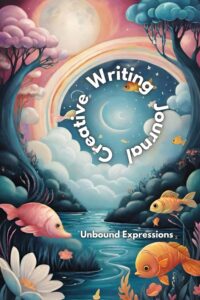
> Unbound Expressions: A Creative Writing Journal <
Unleashing the Power of Your Words
Words are an incredibly potent tool. They can alter perspectives, incite action, and disrupt prevailing paradigms. This potency demands a responsible and reflective approach to your writing. Aim not only to share information but to move hearts and shift minds. Don’t shy away from confronting complex issues, but in doing so, respect the differing viewpoints of others. Remember, every piece you write should encapsulate your essence and your aspirations for the world.
Strive to inspire through your writing. Advocate for change, for justice, and for truth. Explore the art of persuasion, utilizing compelling narratives to win over your readers. Harness the profound strength of your words, transforming them from mere sentences on a page into catalysts for change. While you seek to shape the world around you, ensure your words reflect your highest ideals and the respect you hold for the myriad voices in the dialogue. Your words are your legacy. Make them count.



Embracing Freedom of Speech in Your Writing
The decision to integrate freedom of speech into your writing is an act of bravery. It is an invitation to potentially divergent, even opposing, viewpoints and necessitates a readiness to stand by your assertions. Yet, the value of this freedom is incontestable as it sustains the foundations of an inclusive, multi-voiced, and community culture.
Thus, write with conviction, with your truth ringing loud in your words. Make a stand for your beliefs and ideologies. While doing so, maintain a respectful and open-minded stance, recognizing the richness that differing perspectives bring to the conversation. Your voice, your thoughts, and your ideas are essential, and they hold the potential to inspire change. Be bold, be brave, and let freedom of speech be the wind beneath your writing wings.
The Courage to Speak Your Mind
Embracing the audacity to voice your ideas, particularly through writing, can be a daunting endeavor. It lays you bare to potential critique and disapproval. However, the remarkable attribute of bravery is that it expands each time it is summoned. Every instance of conveying your thoughts with candor and authenticity fortifies your determination, bolstering your resilience.
It propels your growth as a writer and as a communicator, enabling you to stand firm against waves of criticism, and serves as an inspiration for others to follow suit. Your brave action of speaking out encourages others to shun their inhibitions and articulate their thoughts without apprehension.
In the grand scheme of things, your courage acts as a lighthouse, leading the way for others to express their perspectives fearlessly and stand their ground. Indeed, the courage to speak your mind becomes a force for change, driving you and others towards a more open, expressive, and equitable discourse.
